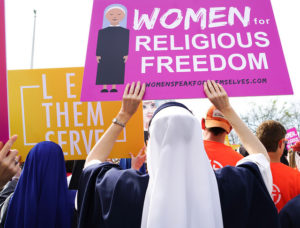
EPA announces repeal of the Clean Power Plan, President Trump signs an EO to provide “Obamacare relief,” and more…
IN THE NEWS
- The U.S. Environmental Protection Agency (EPA) announced the repeal of the Clean Power Plan, an Obama-era effort to reduce carbon emissions. The Clean Power Plan faced legal challenges, so it had not gone into effect yet. EPA Administrator Scott Pruitt repealed the rule to prevent “its devastating effects” from being “imposed on the American people. New York Attorney General Eric Schneiderman (D) promised to fight the repeal, which he called an “illegal effort to turn back the clock on public health.”
- President Donald Trump signed an Executive Order to “provide millions of Americans with Obamacare relief.” The Order directs agencies to implement regulations to increase competition, choice, and the quality of healthcare options. U.S. Senator Charles Schumer (D-N.Y.) tweeted that this Executive Order is President Trump’s latest step “to sabotage healthcare at the expense of millions of Americans.”
- The U.S. Supreme Court vacated one of the cases challenging the Trump Administration’s travel ban. The case was based on one of the sections of Executive Order 13,780, which barred certain citizens of Iran, Libya, Somalia, Sudan, Syria, and Yemen from entering the United States. Since the period of exclusion created by the executive order ended on September 24, the Court reasoned that no “live case or controversy” remained.
- The Attorneys General for the states of California and Washington filed separate lawsuits against the Trump Administration over two interim final rules that, in the words of the Washington Attorney General’s complaint, “slashed the contraceptive coverage introduced by the Affordable Care Act.” The rules allow employers to refuse to provide insurance for contraceptives on religious and moral grounds. Both Attorneys General asserted that the regulations defy the Administrative Procedure Act, as well as certain constitutional provisions.
- The U.S. Department of the Treasury released a report with guidance on streamlining and reforming the U.S. regulatory system, specifically for capital markets. The guidance suggested repealing sections of the Dodd-Frank Wall Street Reform and Consumer Protection Act and using more “robust economic analysis” to make the rulemaking process more “transparent.” Steven T. Mnuchin, Secretary of the Treasury, said that by “streamlining the regulatory system, we can make the U.S. capital markets a true source of economic growth.”
- U.S. Representatives Carlos Curbelo (R-Fla.) and Seth Moulton (D-Mass.) introduced a bill that would ban the manufacture, sale, and use of “bump stocks,” devices designed to increase semi-automatic weapons’ rate of fire. Moulton said, “Passing this legislation…will allow us to help make America safer.”
- The Federal Election Commission (FEC) asked for comments on a notice of proposed rulemaking on “disclaimers on certain Internet communications.” The FEC requires disclaimers “on certain communications to identify who paid for them and, where applicable, whether the communications were authorized by a candidate.” The FEC, which requested comments on the proposition in 2011 and 2016, “reopened” its comment period once again, citing “developments since the close of the last comment period.”
- The Mine Safety and Health Administration delayed implementation of a rule that will require examination of working places in mines before miners can begin working there. The rule was originally scheduled to go into effect on March 2, 2018, but the Trump Administration delayed the effective date to June 2, 2018, “to ensure compliance readiness.”
- The Cook County, Illinois, Board of Commissioners voted to repeal a November 2016 ordinance requiring any distributor or retailor to impose a tax on the sale price of a sweetened beverage. The Cook County Board President Toni Preckwinkle said she is disappointed with the outcome, but has begun to focus on “what matters most: doing the hard work necessary to build a healthier, safer and more efficient Cook County.”
- President Trump announced his intent to nominate Kirstjen Nielsen, current White House principal deputy chief of staff, to run the U.S. Department of Homeland Security (DHS). In a statement, President Trump noted that Nielsen has “extensive professional experience in the areas of homeland security policy and strategy, cybersecurity, critical infrastructure, and emergency management” and is the first nominee to have worked within DHS previously.
WHAT WE’RE READING THIS WEEK
- In an article for the New York Times, Richard L. Revesz and Jack Lienke, both of the New York University School of Law, declare that the cost-benefit analysis EPA used to justify its potential Clean Power Plan repeal is the result of “numerical smoke and mirrors.” Revesz and Lienke outline the “methodological contortions” that EPA used to depict the Clean Power Plan as “a bad deal for the American people.” According to Revesz and Lienke, the “very basic truth” at stake is “that any ‘savings’ achieved by rescinding the Clean Power Plan will come at an incredibly high cost to public health and welfare.”
- In a recent paper published in the online supplement to the Columbia Law Review, Melissa Mortazavi of the University of Oklahoma College of Law warned against agencies using natural language processing programs to analyze public comment in place of humans. Mortazavi claimed that such a replacement would be dangerous because “notice-and-comment rulemaking is predicated on the unknown—the most valuable and useful comments are those that were previously unanticipated.”
- In a paper, James B. Speta, Professor and Associate Dean for International Initiatives at Northwestern University Pritzker School of Law, discussed how Uber and other ridesharing services are upsetting taxi regulation, and how the market structure has been changed without “creating the fear of a new monopoly.” Speta then provided guidance on how to manage the transformation of these “ride markets.”



